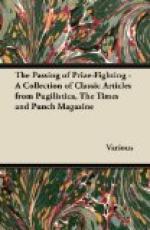* * * * *
In A Certain Star (HODDER AND STOUGHTON) Miss PHYLLIS BOTTOME achieves the difficult feat of treating a love conceived in a romantic vein without declining upon sentimentality, and seasons her descriptions, which are shrewdly, sometimes delicately, observed, with quite a pretty wit. I commend it as a sound, unpretentious, honestly-written book. Sir Julian Verny, a baronet with brains and a very difficult temper, falls a captive to Marian’s proud and compelling beauty. Then, just before the War flames up, secret service claims him, and he returns from a dangerous mission irretrievably crippled. Marian fails him. True, she disdains to be released, but out of pride not out of love. It is little grey suppressed Stella (her light has been hidden under the dull bushel of a Town Clerk’s office) who comes into her kingdom and wins back an ultra-sensitive despairing man to the joy of living and working and the fine humility of being dependent instead of masterful. There are so many Julians and there’s need of so many Stellas these sad days that it is well to have such wholesome doctrine stated with so courageous an optimism.
* * * * *
There is a sentence on page 149 of A Castle to Let (CASSELL) which, though not for its style, I feel constrained to quote: “It was a glorious day, the sunshine poured through the green boughs, and the moss made cradles in which most people went to sleep with their novels.” Well, given a warm day and a comfortable resting-place, this book by Mrs. BAILLIE REYNOLDS would do excellently well either to sleep or keep awake with, according to your mood. The scene of it is laid in Transylvania, where a rich young Englishwoman took an old castle




